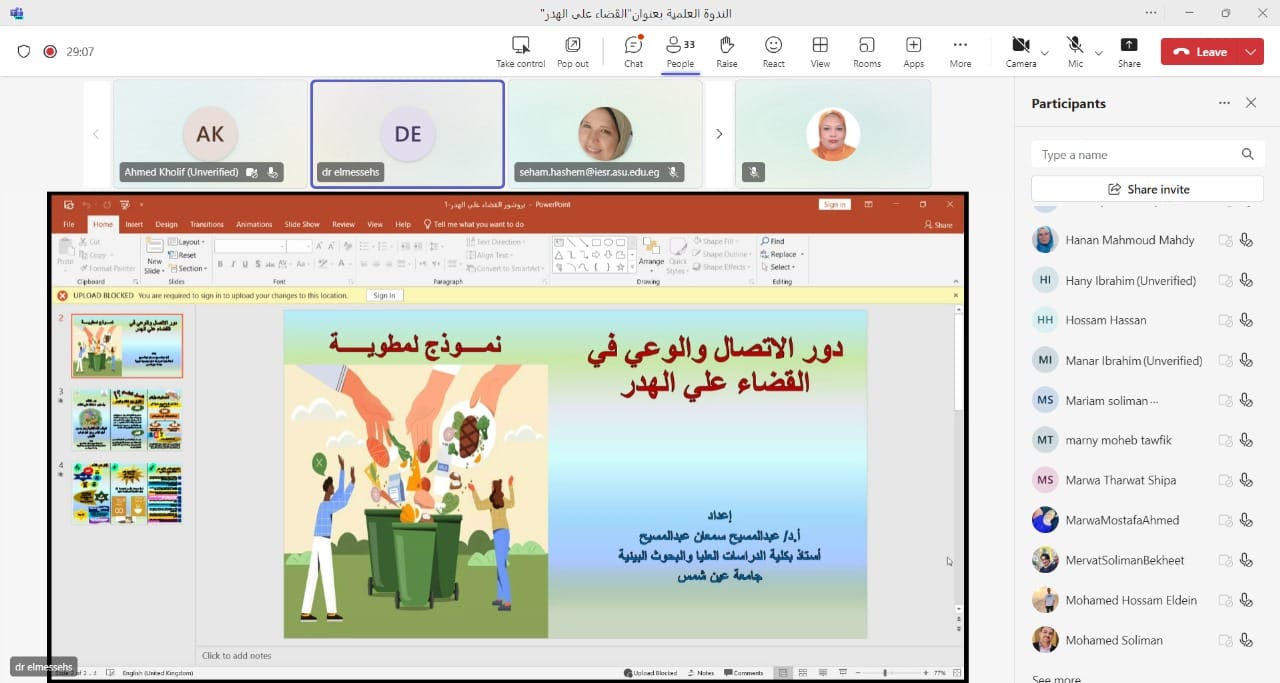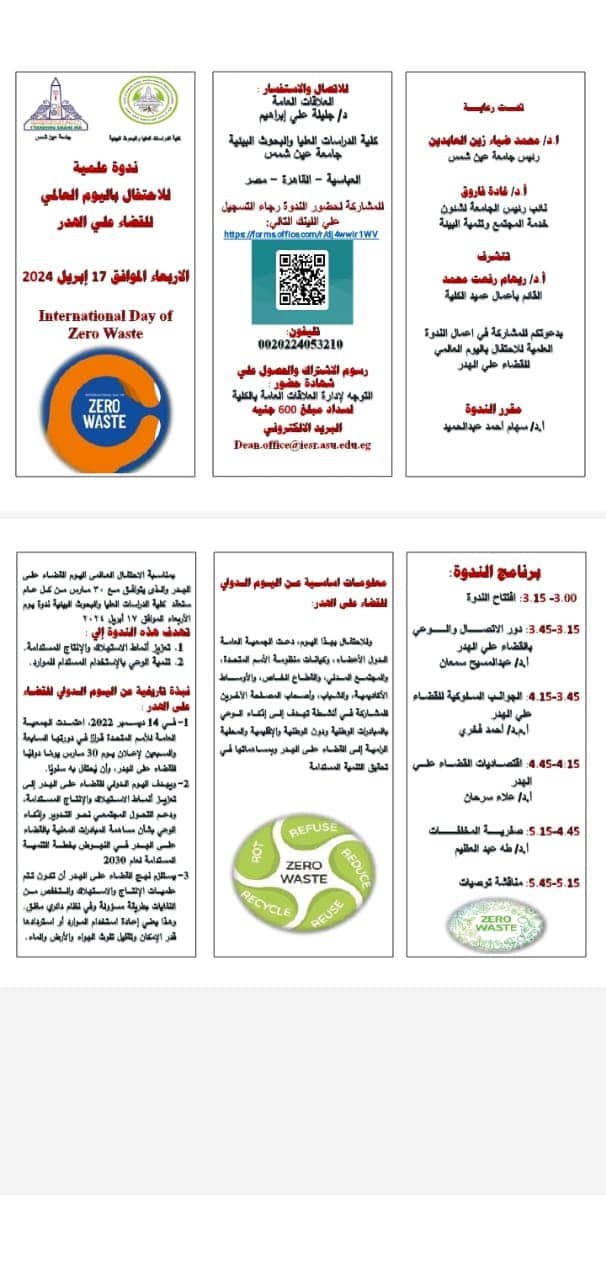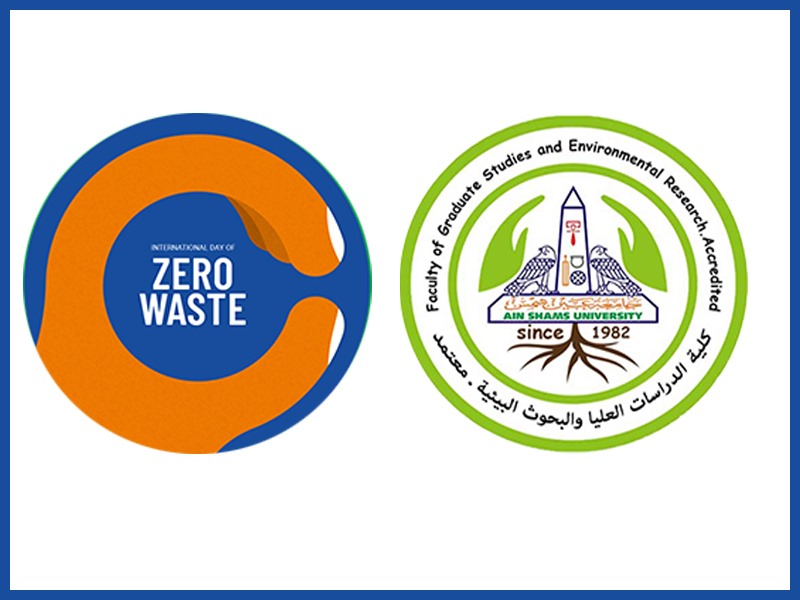The recommendations of the scientific symposium of the Faculty of Graduate Studies and Environmental Research in celebration of the International Day of Zero Waste
The scientific symposium held by the Faculty of Graduate Studies and Environmental Research at Ain Shams University on the occasion of the celebration of the International Day of Zero Waste, was held under the auspices of: Prof. Mohamed Diaa Zain El-Abedeen, President of Ain Shams University, and Prof. Ghada Farouk, Vice President of the University for Community Service and Environmental Development Affairs, and Prof. Reham Rifaat, acting dean of the Faculty, presented a set of recommendations, including activating the role of communication to eliminate waste through formal institutions such as schools and universities and informal institutions such as the media, family and religious institutions.
The recommendations also stressed the role of using visual communication means, such as brochures and posters, to raise awareness to eliminate waste, and the necessity of developing some mechanisms to modify behavior to reduce the waste of resources and to support behaviors related to reducing waste in the use of energy/water/food.
The symposium also recommended raising awareness of the danger of plastic waste, encouraging responsible consumption through various awareness channels, emphasizing the role of role models in simulating responsible behavior towards the environment, increasing resource efficiency and reducing the environmental impact in the product’s life cycle, and the necessity of having supportive policies for the success of dealing with waste through encouraging incentives for recycling and applying Fines.
 |
 |
The symposium also recommended moving towards a circular economy to reduce waste and reconsidering the design of packaging materials to achieve sustainability and reduce waste.
Prof. Reham Refaat, Acting Dean of the Faculty, explained that the celebration of the International Day of Zero Waste comes within the framework of the adoption by the United Nations General Assembly on December 14, 2022, of a resolution at its seventy-seventh session declaring March 30 an International Day for the Elimination of Waste, and it is celebrated annually, pointing out that the symposium was held on Wednesday, April 17, 2024, via the Microsoft Teams application, and the number of participants in the symposium reached (48) master’s and doctoral students.
She added that the symposium aimed to promote sustainable consumption and production patterns, develop awareness of the sustainable use of resources, support societal transformation towards recycling, and raise awareness about the contribution of initiatives concerned with eliminating waste in advancing the 2030 Sustainable Development Plan. The zero-waste approach requires that the production, consumption and disposal of waste be carried out in a responsible manner and in a closed circular system. This means reusing or recovering resources as much as possible, and reducing air, land and water pollution.
It is noteworthy that the rapporteur of the symposium is Prof. Siham Ahmed Abdel Hamid, Professor of Agricultural Economics, Head of the Agricultural Environmental Sciences Department, and Director of the Quality Unit at the Faculty. The symposium program included a lecture entitled “The Role of Communication and Awareness in Eliminating Waste,” where Prof. Abdel Masih Samaan, Professor of Environmental Education, Department of Educational Sciences and Environmental Media, gave a lecture.
This was followed by a lecture entitled “Behavioral Aspects of Eliminating Waste,” in which Prof. Asst. Dr. Ahmed Fakhry, Professor of Psychology, Head of the Department of Environmental Humanities, gave a lecture.
This was followed by a lecture entitled “The Economics of Zero Waste”, where Prof. Alaa Sarhan, Professor of Environmental Economics, gave a lecture.
This was followed by a lecture entitled “Zero Waste”, where Prof. Taha Abdel Azim, Professor of Environmental Chemistry, gave a lecture.


.svg)




